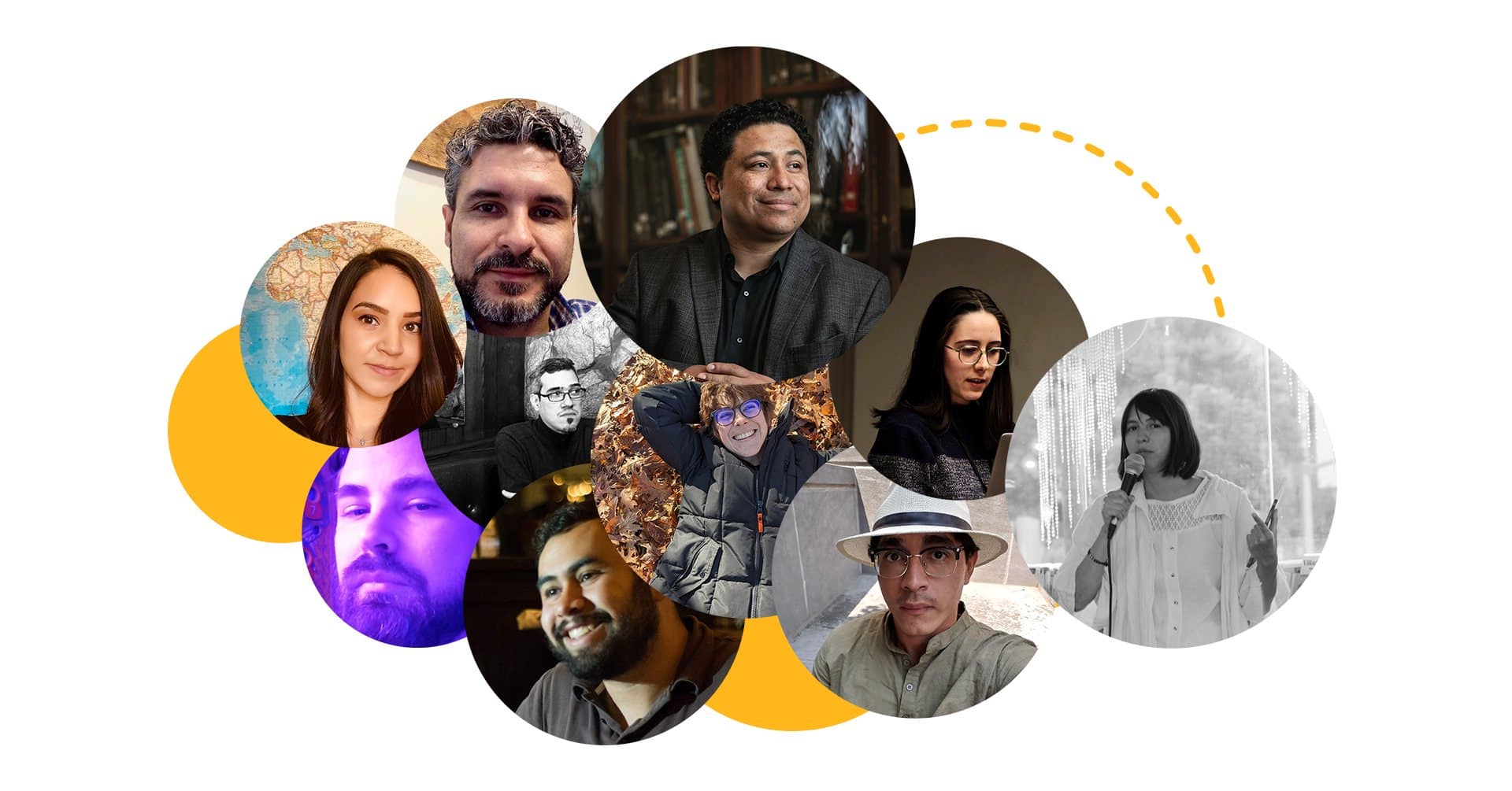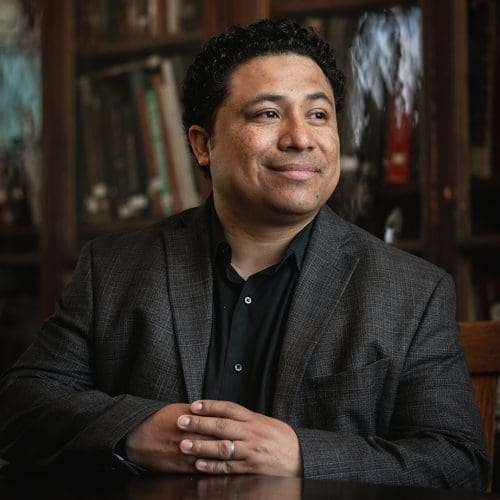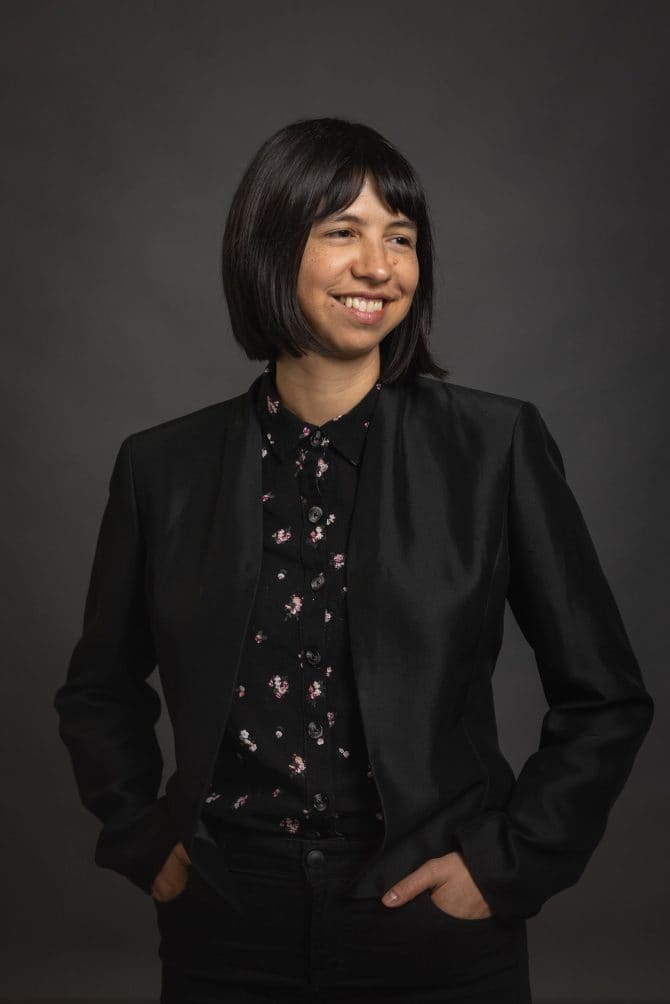 Written by Joe Armstrong, Content Specialist, Marketing, Downtown Main Library
Written by Joe Armstrong, Content Specialist, Marketing, Downtown Main Library
Join us for a powerful evening of poetry from Latinx authors as part of our celebration of Hispanic Heritage Awareness Month at Migrating Words: A Bilingual Poetry Event, opens a new window on October 10 from 6:30-8 p.m. at the Clifton Branch Library, opens a new window.
Readings will be done by past Cincinnati Poet Laureate Manuel Iris, Violeta Orozco (International Latino Book Award winner), Francisco Barraza, Julia Piastro, Olga Sanz Casasnovas, Stephanie Alcantar, Tomás Arce, Luis Barreto, Juan Pizzani, and Mauricio Espinoza.
Ahead of the event, Manuel Iris and Violeta Orozco shared insights into their writing process, their recent works, and what they’re looking forward to at Migrating Words: A Bilingual Poetry Event:
What can attendees look forward to hearing from you at Migrating Words: A Bilingual Poetry Event?
Violeta: I will read selections from my award-winning book, The Broken Woman Diaries, opens a new window.
Manuel: Attendees can expect to see themselves in the voices of these poets. We will recognize how different, and also how alike, all humans are. The music of the Spanish language, as will poems in English.
Migrating Words: A Bilingual Poetry Event will bring together 10 Latinx authors for a powerful evening of poetry. How have you found interacting with other poets has benefited your writing? What are some ways poets can find other poets to collaborate?
Violeta: Absolutely. For me, poems are raised and nurtured in community. My work derives its strength and power from the Latinx and American communities that have fostered them through workshops and readings. Sometimes I write a poem as a response to another one I heard at a reading, with my friends, we try to use our own poems as a prompt for each other. I also use performance events or public readings to get to know fellow poets in the area better and to see what the audience is into. I go to a weekly open mic in Cincinnati and polish my stage practice there, learning from the spoken word poets and sometimes even writing specific poems to be performed for the open mic. I am involved with several poetry organizations across the country where I take workshops every week. One of them is Ohio Poetry Association. I would recommend those wanting to connect with other poets in Ohio to become members of this organization and look for free poetry workshops in the public libraries like the Mercantile.
Manuel: I am a reader of all the other poets. I admire their work and am constantly looking forward to talking with any of them. I believe sharing spaces, readings, and conversations with them is part of my poetic process.
With works published in both Spanish and English, how do you view the intersection of language and poetry? Does your writing process change between languages?
Violeta: Well, I am writing more and more in Spanglish every day, and I believe I owe that freedom to great poets and practitioners of multilingual writing like Uroayan Noel and the Nuyorican and Chicano poets who paved the way for us to write in two languages at the same time. Belonging to two different writing traditions can be disorienting, but I think mostly for the readers, that usually pin you down as whatever is a simpler image as an author. I have a book coming out in Mexico in Spanish of travel essays, but I mostly write in English because most of my audience is Latinx or American at this point. I have two poetry collections in English already accepted by two publishers in North Carolina and California. When my first poetry book in Spanish came out in Mexico, it had no audience, no one bought it or even reviewed it. And I think that really made me realize that my career as an author really took off here in the US, where I have received so many awards, scholarships, fellowships, and professional support that I truly feel blessed to have come to the USA at the moment when Latinx writing was booming.
Manuel: To talk about my writing process as a bilingual poet, I must first say that I believe poetry is a translation of silence. I believe that every poet is finding ways to articulate what is impossible to say with words: we try to utter something beyond our nature. So, going from one language to the other is just another link in the creative chain, another puzzle that is impossible to resolve fully.
Except for one time, poems only come to me in Spanish, and then I have to re-write (more than translate) them into English, which has become part of my editing process. Sometimes, I change the original to “fit” the English version.
Both of you have been involved in the academic study of writing, either holding or pursuing a Ph.D. How has this experience impacted your writing?
Violeta: My Ph.D. has been a huge learning opportunity to perfect my craft and introduce me to contemporary authors writing in English, as well as having the opportunity to workshop my poems with some of the best poets in Cincinnati. Actually, before entering the program at the Romance Languages Department, I made a deal with my dissertation advisor for me to major in both English and Spanish, since I write mostly in Spanglish and am mostly engaged with the Chicano tradition. He helped me design a curricular structure where I could take half my classes in the English Department. Their classes from the Ph.D. in Creative Writing program have some of the best poetry professors I ever had. I feel really at home in those creative writing workshops, and have benefited so much from having classmates that are from so many different parts of the English-Speaking world. Most of us in Aditi Machado's poetry workshop are poets of color, which goes to show how much important work is produced by non-white people, immigrants and people of the diaspora.
Manuel: Those are two parts of my writing life, and they certainly communicate but are nevertheless very clearly separated for me. When the poet is writing, the academic has to let him take risks and make mistakes. The academic mind is guided by intelligence, and the poetic mode of thinking thrives in intuitions, exploring silences, phonetic associations, wordplay, and creative possibilities closer to a child’s play or an epiphany, than to theoretical frames. I am sure that any person can be both an academic and a poet, just not at the same time.
What advice would you give aspiring poets hoping to be published for the first time?
Violeta: Submit. Submit, submit. It is key to submit poetry to contests all the time. I got my second and third poetry collections published that way. Connecting with your local community for workshops, I know CHPL's Writer-in-Residence Pauletta Hansel gives a bunch of workshops and Yaeli Kaweda has office hours, is useful to access publishing and networking opportunities.
Manuel: Write without fear. Be true to yourself, and believe that your story and voice are important. Looking for publication can be challenging, but the most crucial part comes before: writing is looking deep into yourself, transcendence, and humanity. If you do that with care and respect, you will be happy to have ever published your work.
What are you reading right now?
Violeta: The New Black, opens a new window by Evie Shockley, and Dark. Sweet by Linda Hogan.
Manuel: A novel called Ceniza en la boca by the Mexican novelist Brenda Navarro, three different books about the medieval painter Hieronymus Bosch, and a book of poems by Lee Young Lee. I am a very disorganized reader.
Violeta, you recently won an International Latino Book Award for The Broken Woman Diaries, your third book and debut full-length collection in English. Share with us what led to you writing this book and why it has so strongly resonated with readers.
Violeta: The Broken Woman Diaries is an exploration of dismembered female selves, particularly, a meditation of how women of color in the Americas have been forced to split our spirit and our body, negotiate our sexuality in a particularly cruel way, alienate ourselves from our eroticism. I started this book when I was studying for my Masters in Ohio University. Since I had not managed to get into an MFA or a writing program that year, I put all of my energy into writing my poetry collection. I decided it was going to come out no matter what. I didn't even have a publisher at the time, but I was confident someone would take the book. It was going to be raw and real, and publishers always like that.
The title was born even before the poems, right after I read Simone de Beauvoir's La femme rompue literally translated as "The broken woman", but it was mostly inspired by Chicana writers, who have been mis grandes maestras, my greatest literary teachers. They are also engaged with recuperating our indigenous roots, and they really inspired me to embrace my indigenous heritage. Gloria Anzaldua wrote a lot about Coyolxauhqui, the famous Aztec moon goddess, and understood her figure to be a catalyst for internal transformation, to help us heal from the colonial wounds.
What inspires me about Coyolxauhqui is how fierce of a female warrior she is, how she challenges the authority of her mother, and then of course her brother finds out what she plans to do and beheads her and throws her down Coatepec Hill, and that is how Coyolxauhqui gets dismembered. But this book also honors my mother. Without her, the book would not have won the Latino Book Award, nor the Golden medal for The Juan Felipe Herrera Best poetry book written in English, because she is the illustrator of the collection. This is my greatest source of pride. That the spirit of the book is best embodied in the illustrations produced by a painter and sculptor from Mexico City, Perla Temoltzin, who happens to be my mother but is a great artist in her own right, and whose style of painting is inspired by the Aztec códices. I was very fortunate to team up with her thanks to the publisher, who suggested this extraordinary collaboration. I think this artistic unity of painted and written story is part of why it has resonated so much with readers.
Violeta, you’ve said that the title and cover of The Broken Woman Diaries draws from roots in Aztec mythology and the goddess Coyolxauhqui as well as Simone de Beauvoir’s Broken Woman. How did you first decide to incorporate these into The Broken Woman Diaries and what role does heritage play in your poetry?
Violeta: I have been writing since I was a child and I already had a book out in Mexico City, but The Broken Woman Diaries really feels like my debut poetry collection, because it was the first time I had written without fear of being escandalosa. Sandra Cisneros' Loose Woman poetry collection and Gloria Anzaldúa's Borderlands/La frontera guided me in writing with my two heritages and tongues, both of which have been inscribed into my body since I was a baby, one by my mother, the other one by my father. I have two native languages, and my attachment for them is equally strong. I was not born with a single heritage, and it was my duty to honor my father tongue, English, which was the language I spoke to my father in Mexico City until I was 14 years old, the language in which he read to me my bedtime stories and that later became the literature that most influenced me. In a sense it could be said I was raised half Chicana, reading mostly American and Mexican literature, and pretty much world literature written in English, so I always felt part of that conversation. It was kind of a secret language my dad and I used to speak about my monolingual Spanish speaking family on my mum's side when they were in the same room and we didn't want them to hear us. A secret code in which I could say whatever I wanted, felt fully free to write without the censorship of the Mexican state authorities. This is something the Chicanas have excelled at, sticking out their tongue at misogynistic catholic gender scripts and rewriting the Mexican (and American) literary tradition, creating a version of oversexed, naughty, irreverent, hedonistic women. I needed that to breathe, to become whole as an artist, to push the limits of the way female sexuality was written about in Mexico while I was growing up there.
Manuel, you’ve described poetry as a “sister to music.” How would you describe the rhythm and melody of your works? Have they changed over time?
Manuel: Yes, they have. And they will continue changing over time. My poems have become shorter, more precise, and somehow slower. I can see my past work and smile, but I wouldn’t be able to write those poems today. My inner rhythm and some of my interests have changed.
Manuel, your published writings have spanned continents, from Before the mystery published in El Salvador to being printed in Angola’s Jornal de Angola. Describe how that experience has been sharing your writing across countries and cultures.
Manuel: I have been lucky to find readers, publishers and translators in places I have never visited. My poetry has been in more places than myself, and I consider that lucky. It is a humbling, surprising experience. People's interest in the things I write in solitude, is always unexpected.
Learn more about Migrating Words: A Bilingual Poetry Event on October 10 from 6:30-8 p.m. at the Clifton Branch Library on our website.





Add a comment to: An Interview with Award-Winning Poets Manuel Iris and Violeta Orozco